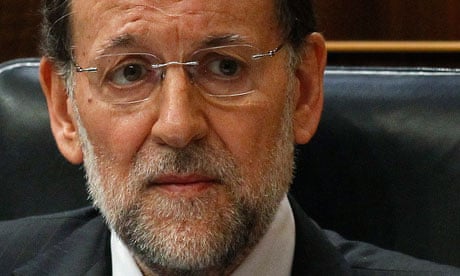Spain's rightwing government came under pressure on Thursday to apply for rescue funds from Brussels after it became clear that the estimated €100bn (£80bn) bailout of the country's banks had failed to prevent Madrid's borrowing costs from hitting new highs.
The interest rate on Spain's benchmark 10-year bonds rose as much as 25 basis points to a euro-era high of 7.02%, breaching the level that triggered a collapse in confidence in Portugal, Ireland and Greece.
Italy's flagging economy was also under the microscope after panic among international lenders at an auction of three-year bonds pushed the price of borrowing to 5.3%, up from 3.91% last month.
Rome has succeeded until recently in convincing investors that a mix of austerity and economic reforms have put the country in a better position to weather the eurozone crisis, but political stalemate over deregulation of several markets and resistance to labour reforms, coupled with the longest double dip recession among the major eurozone countries has undermined the confidence of many investors.
Stock markets fell on the news, with the FTSE 100 index dropping 26 points to 5457 at lunchtime. The German Dax was down 22 points at 6130 and the French Dax slipped 9 points to 3020.
The jump in Spain's borrowing costs followed a downgrade by the ratings agency Moody's of three notches from A3 to Baa3. The cut in Spain's sovereign debt puts its credit status alongside Croatia and Azerbaijan with a rating just above "junk".
Moody's said the downgrade followed the offer from eurozone leaders of up to €100bn to prop up its failing banking sector, which the ratings agency believes will add considerably to the government's debt burden.
The downgrade will hurt Spain because organisations such as pension funds are mandated not to invest in assets with such a low score.
Moody's said the Spanish government's ability to raise finance on the world's markets was being hindered by high interest rates, a situation which had led it to accept funds to recapitalise its debt-burdened banks.
Some details of what the bailout might look like have emerged after European officials said they were considering selling off bank assets as part of the plan to prop up the Spanish banking sector.
Brussels also sought to make it clear that Spain was likely to pay an interest rate nearer 8.5% on the loans under one plan under discussion, which is much higher than the 3% outlined in initial reports of the deal.
Eurostat, the European statistics agency, said earlier in the week that it was unclear how much the country's deficit would rise, because it depended on how Brussels lent the money to Spain's banks.








